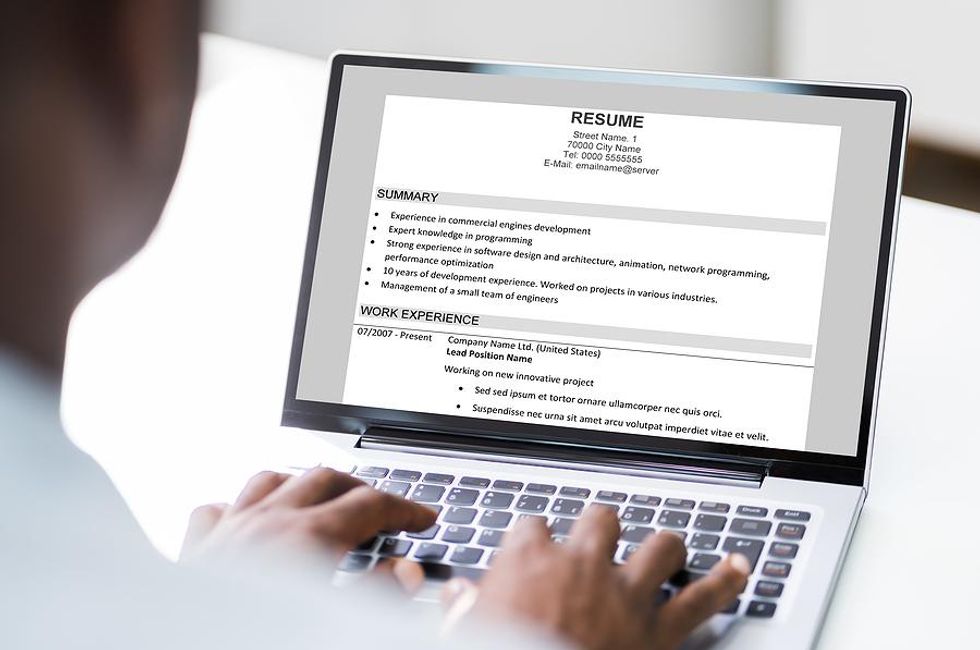
The average amount of time a recruiter or hiring manager will spend scanning your resume is seven seconds. That's why it's important to have just the right kind (and amount) of information on your resume.
The phrase “less is more" has often been used for design purposes, but it can apply just as well to your resume. The point is to only keep information on your resume that is clear, simple, and that supports your personal brand. It is a balance of having just enough information to draw the interest of an employer while leaving room for you to further explain during an interview.
The more irrelevant information you add to your resume, the more it dilutes your key message. Employers today also look right through fluff words and are rather annoyed by them.
So, how can you optimize your resume and make sure it contains the precise balance of information?
Try removing these 10 things from your resume today:
1. Replace The Objective Statement On Your Resume With An Experience Summary
Employers today are not that interested in what you want. You need to tell them what you can do for them. The most effective way to achieve this is by replacing your objective statement with an experience summary.
An experience summary is a list of skills you have that are needed for the job you're applying for. They're hard skills and transferable skills, not soft skills. By removing that objective statement, you're able to clearly start proving your value to the employer within the first few seconds they glance at your resume.
2. Eliminate Superfluous Or “Fluff" Words

Bigstock
We can't tell you how many resumes start with "Dynamic visionary…" We call these "fluff" statements because anyone can make them and they add no real value to your resume.
Keep your message on point and stick to the facts. If you want to express certain traits, demonstrate them with what you have achieved or accomplished. Quantify your work experience. Whatever you do, just avoid meaningless, baseless statements.
3. Edit Out Bad Grammar & Spelling Errors

Bigstock
Spelling and grammar mistakes are a big turnoff for hiring managers. Triple check every headline and bullet point. Remove or reword any sentence that doesn't flow. Don't mix up tenses or third and first-person perspectives.
When in doubt, have a trusted friend or colleague review your resume. That way, you can be sure every spelling or grammar mistake is caught before you apply for a job.
4. List Your Primary Phone Number And Toss The Others

Bigstock
You want every section and piece of your resume to be simplified. Having multiple phone numbers right at the top of your resume makes it feel cluttered and disorganized even before you get to the experience section.
If you must list more than one number, make sure to specify under what conditions the other numbers should be used.
5. Remove Discriminating Information

Bigstock
Avoid information that can lead one to discriminate against you, including age, sex, religion, marital status, and ethnicity. This includes the use of photos that should never be on a resume unless your face is an important part of your job (e.g., modeling, TV, etc.). In fact, some employers are forced to ignore your resume if it contains such information because of the chance that they may be accused of discrimination later in the process.
For seasoned professionals, age discrimination can be a very real thing. That's why you should follow these tips on what to remove from your resume. You want to optimize your resume, not submit an outdated one.
6. Throw Out Your GPA

Bigstock
You do not need to reveal your graduating year, the institution(s) you transferred out of, or the high school you attended. You should also remove your GPA if you've been out of school for a while or if the number just isn't impressive.
Keep information on your education specific to the degree received, the major completed, and the institution you attended.
7. Get Rid Of Any Irrelevant Information
 Bigstock
BigstockEmployers are not interested in achievements or abilities that are not applicable to the job. If you are in sales and you helped develop an Access database to track supplies, that's nice but not relevant.
Also, be cautious about listing your associations or volunteer work that is irrelevant or may be in conflict with the potential employer. You can find this information while conducting research on the company.
8. Remove Technical Skills For Basic Software Programs

Bigstock
Most employers today expect you to be familiar with basic computer programs, such as Word, Excel, and PowerPoint. So, don't waste valuable space on your resume listing them. It's more than okay to remove them from the document entirely.
When choosing which software programs and technologies to include on your resume, think about which ones will help you succeed in the job you're applying for. Which ones will make you stand out from the competition?
9. Do Not Include References Unless Requested

Bigstock
Employers expect you to offer references when requested, which is typically during the latter part of the interview process.
A big pet peeve of recruiters is seeing "References available upon request" on the resume. Do you really know anyone who would refuse to give references?
10. Cut Back On Lengthy Content

Bigstock
If you are a recent graduate, most employers do not expect your resume to be more than one page. However, if you have had considerable professional experience, your resume should be two to three pages long. The notion all resumes should be one page is not true, especially in this job market. Resumes need to have enough detail to support your positioning so a two- to three-page resume is acceptable. But, your resume shouldn't be so long that it works against you.
Your resume has to have a compelling message and be easy to read, so after you have tightened up your content, format it to have a decent amount of white space.
Finding the right balance of information for your resume can make it impactful. It's not about how long or short your resume is, or how many employers you've worked for, but finding the right information and words to present it in the best light to demonstrate that you have the specific experiences and skills the employer is seeking. So, keep in mind the phrase, "less is more" when writing or updating your resume.
Writing an optimized resume is no easy task. By removing these 10 things from your resume, you'll be that much closer to landing an interview and securing your next job.
Need more help optimizing your resume?
Sign up for our FREE Resume & LinkedIn Bootcamp today to learn how to update your resume and LinkedIn profile the way recruiters want!
- 3 Reasons You Should Never Post Your Resume Online - Work It ... ›
- Top 100 Most Powerful Resume Words - Work It Daily | Where ... ›
- 3 Best Resume Tips For Older Workers - Work It Daily | Where ... ›
- 5 Outdated Resume Tips To Ignore In Your Job Search - Work It Daily | Where Careers Go To Grow ›
- How To Optimize The Most Important Part Of Your Resume - Work It Daily | Where Careers Go To Grow ›
- 4 Ways To Edit Your Resume Like A Professional Resume Writer - Work It Daily | Where Careers Go To Grow ›
- 6 Common Resume Grammar Rules You Should Know - Work It Daily | Where Careers Go To Grow ›
- What Needs To Be On Your Resume (And What Doesn't) - Work It Daily ›
- 10 Ways To Condense Your Resume Without Losing Value - Work It Daily ›
- Compound Modifiers: The Most Confusing Words On A Resume - Work It Daily ›
- How To Use Compound Modifiers On Your Resume - Work It Daily ›
- What Your Resume Must Include To Land A Job In 2021 ›
- 10 Key Components Of A Great Resume - Work It Daily ›
- 3 Reasons Why Your Resume Isn't Working ›
- 3 Ways To Update Your Resume To Land More Job Interviews - Work It Daily ›
- What To Do If You Hate Writing Resumes - Work It Daily ›
- Exit Statements: What To Say When You've Been Let Go - Work It Daily ›
- 7 Reasons Why Your Resume Is Boring (And How To Fix It) - Work It Daily ›
- Why A Summary Isn't Necessary (Or Recommended) On A Resume - Work It Daily ›
- 4 Ways To Turn Resume Fluff Into Marketable Facts - Work It Daily ›
- 3 Easy Ways To Spring-Clean Your Resume - Work It Daily ›
- How To Follow Up On Your Resume Submission - Work It Daily ›
- How To Craft The Opening Statement Of Your Resume - Work It Daily ›

 Bigstock
Bigstock Bigstock
Bigstock Bigstock
Bigstock


